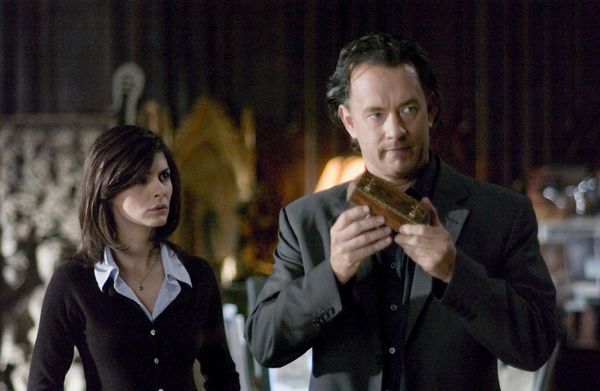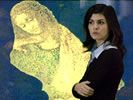Eye For Film >> Movies >> The Da Vinci Code (2006) Film Review
The Da Vinci Code
Reviewed by: Chris

Like a conspiracy theorist's wet dream, The Da Vinci Code arrives on our screens, claiming to be a work of fiction, but enticing us to believe a semi-revealed and darkly hinted substructure of fact.
Tom Hanks leads the fray in this passable, but over-hyped, thriller about one cult dedicated to exposing "the truth" about Christianity (and the Roman Catholic Church, in particular) and another cult - Opus Dei, one of the more extreme branches of the Vatican autocracy - dedicated to preserving the status quo.

The plot gets going with a murder and the discovery of a bloodline going back to a marriage between Jesus Christ and Mary Magdalene. This central premise is fairly weak: the war between the protagonists is based on the idea that, if this central truth is revealed, Christianity (and the 2000 years of oppression that goes with it, specifically that of women and of science) will simply crumble. It is weak, firstly because there is little to suggest that burying one part of a doctrine will cause loss of belief in the whole - where external proof is overpowering, religions generally just adapt. Secondly, to have any real weight, the bloodline idea would need to include some suggestion that Jesus´s powers could have been transmitted genetically, an idea that is not developed in the film.
Like many a heaven-and-hell scenario, The Da Vinci Code swells, or deadens, in the imagination according to whether we hold personal belief in the symbols - to be impressed or frightened by God or the Devil you have to have some suspension of disbelief to say they exist. To some devout Christians, this film will seem heretical, as it questions articles of faith (at one cinema, I was picketed by a man distributing leaflets urging doctrinal belief). To the rationalist, who thinks there is little historical evidence for the Jesus Christ of the Gospels, anyway, it's a non-starter to quibble over whether the central character did or didn't have sex with, or was married to, an alleged prostitute - it is just religious folk arguing over details of their belief system.
The wider importance, if any, of The Da Vinci Code is probably somewhere in the middle. As a movie, it would be forgettable, but the social furore has guaranteed box office buoyancy and discussion. Those of us who are not overly bothered either way about the historical accuracy of the Gospels have been largely disinclined to research the basis of a belief system that has dominated Western culture for two millennia. The film at least suggests one could ask questions. For those doing so, a tantalising mix of fact and fiction has been unravelled, not in any quest for the truth, but just for the sake of telling a good yarn.
"How do we penetrate historical distortion," asks the professor, played by Hanks. Well, Tom, not by tripping out on psychedelic symbols that can be interpreted a million ways and one. The movie's assertion that the Council of Nicea "fixed" what was and what was not to be believed is roughly correct, but historians may rightly question the extent of the cover up. There is no reason to suggest there wasn't an actual man called Jesus - it was a common enough name - but it might raise eyebrows among the scientifically minded that the particular man of the Gospels went unnoticed by all his contemporaries and that "records" of him were compiled at a much later date. Or that many of the texts, including descriptions of attributed miracles, were lifted word for word from the accounts of the lives of pre-Christ characters. None of this proves he didn't exist, of course, but neither does it prove that he did. For our story, we have to believe that he did, so accounts of what the Nicean Council got up to have received some poetic licence. Whether the Christ of the Gospels existed or not, he remains a remarkable figure whom many might find inspiring and it is this type of catchall which Hanks ultimately finds useful.
Predictably, the film ends just as messily, with a few nice, warm, fuzzy truisms and beautiful photography of Roslyn Chapel. Hopefully, tourists won't overrun it - last time I was there it was guarded by several goats.
The film has made a spectacular amount of money, which hardly would have happened without the legends of Christianity to plagiarise, and the attendant publicity probably hasn't done the Church much harm financially, either. Let us hope it will also encourage some people to develop enquiring minds.
Reviewed on: 21 May 2006



















